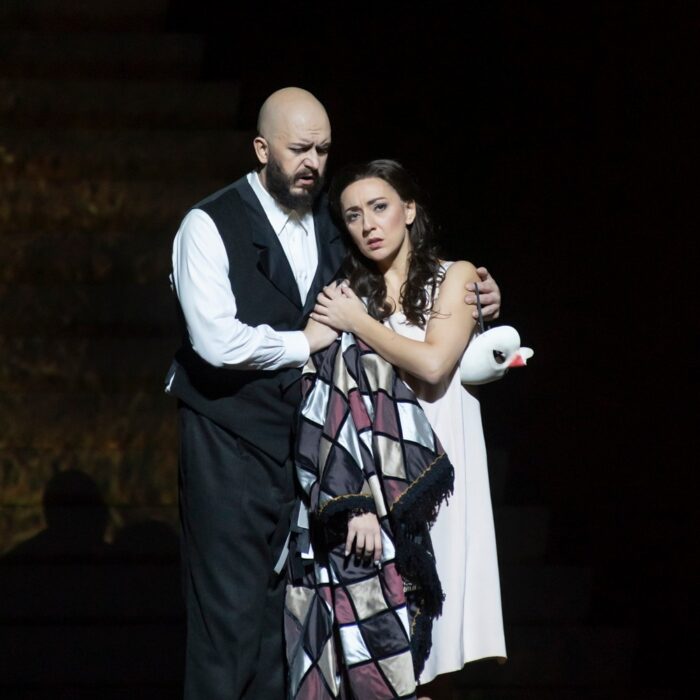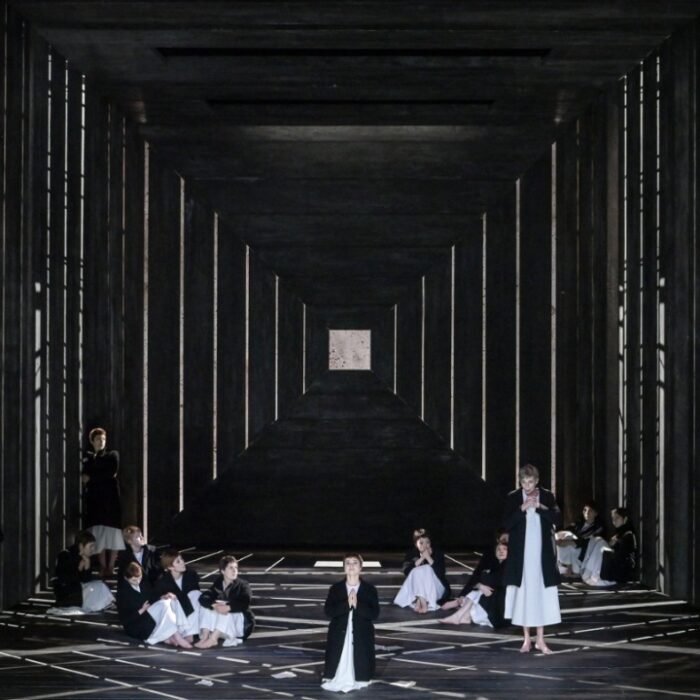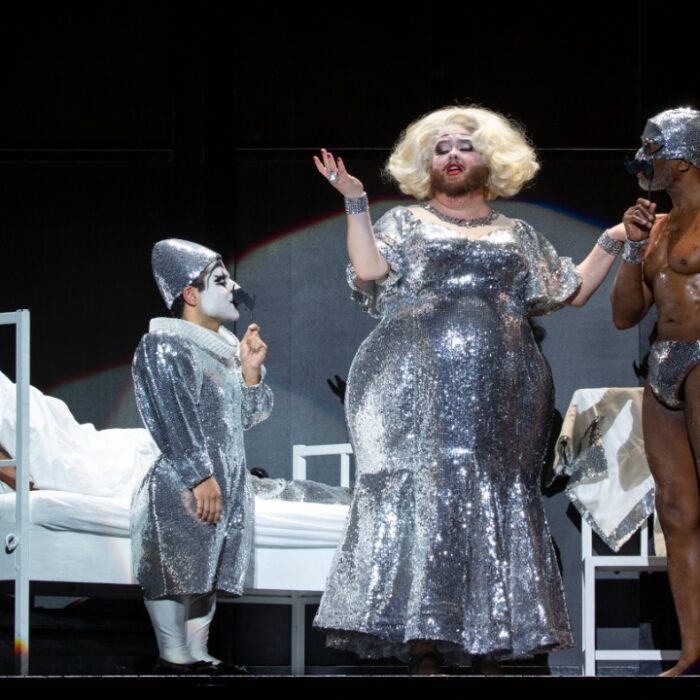
Presidio Theater 2023 Review: ‘Music of Remembrance’
Jake Heggie & Gene Scheer’s Double Bill Honors the Resilience of the Persecuted
By Lois SilversteinCredit: Ben VanHouten
The grass was pristine. The houses lined up along manicured lawns. The street signs sparkled, and the paths swept to perfection. Around each corner and through the trees, the magnificent Golden Gate Bridge stood. Inside the Presidio Theater, a performance titled “Music of Remembrance (MOR)” featured the works “Another Sunrise” and “For a Look or a Touch” by composer Jake Heggie and librettist Gene Scheer.
“Music of Remembrance” produces “works that honor the resilience of all people excluded or persecuted for their faith, nationality, ethnicity, gender, or sexuality.” San Francisco was one of the trio of performances, with the other two taking place in Seattle at Benaroya Hall and in Chicago at The Athenaeum Center for Thought and Culture. Mina Miller, the brainchild behind MOR, introduced the show. The theater on the campus, known as the Base, provided a perfect setting for the double bill. It stood as a reminder of military order while also showcasing two expressions of the necessities of love and politics, aiming to unite rather than tear them apart. A sign outside one of the nearby buildings that read “Rethink Violence” perfectly complemented the atmosphere.
“Another Sunrise”
The double bill provided a neat contrast: A solo performance by soprano Caitlyn Lynch, accompanied by the Music of Remembrance chamber ensemble of six and conducted by Joseph Machevich. “Another Sunrise” tells the story of Krystyna, a Polish woman who was once a political prisoner in Auschwitz and now living with the memory of how she forced her Jewish prisoners in order to survive herself.
In the present, she leads a “good life,” yet the memories of the evil acts she was forced to commit in order to stay alive haunt her. At 4 a.m., she wandered through her comfortable middle-class house, attempting to tell her story into a tape recorder for a professor who sought to understand and wished for her to recount it. She experienced conflicting emotions. She felt worn down by the constant back-and-forth of enduring the pain of remembering and the need to remember. She believed and doubted the purpose she sought, and the penultimate act she performed was recording and discarding the tape. Eventually, she retrieved it and left it on the table as the “curtain” closed. There was no single answer.
Lynch’s voice, accompanied by the ensemble, carried the story excellently, moving from the ordinary to the catastrophic with ease and grace. She “sang” the woe, embracing the lamentation that permeated it. She didn’t skip or evade the anguish; instead, she faced it with each steady pitch. Her entire monologue, in fact, resembled one long keening—a song intertwined with woe, and woe intertwined with song—in the tradition of the ancients who lamented the suffering endured by human beings. There was no escape; there was no refuge from this despair. Once engraved, it remained. The question at that point was how to exist. We couldn’t distinguish between then and now, and the irreversibility of it all was evident. The final line, “I lived to see another sunrise,” stood as the ultimate statement: we found solace in living, yet we also despaired that this scarring was the path we had to follow.
Heggie’s music was of a piece. The clarinet’s acid whine, the melancholic ostinato of the cello and bass, and the violin’s lyrical portrayal of loss blended seamlessly with the tale of human suffering, transcending its nameless vicissitudes. It remained moving and almost heroic throughout, though Krysha explicitly stated that those who lived beyond the war were not just survivors or heroes.
“For a Look of a Touch”
Part two featured “For a Look of a Touch,” recounting the story of Manfred and Gad, two lovers forcibly separated from each other amidst the persecution of gays during the Holocaust. The opera extensively depicted the violence perpetrated against gays in Germany and highlighted how that historical truth was purposefully hidden.
Ryan McKinny portrayed the ghost of Manfred, conjured by Gad, who lived alone in the present, bereft by the loss of his love and the suffering the two endured before, during, and after the war.
Gad, portrayed by Curt Branom, carried the bulk of the story, tracing the trajectory of what happened and why. Gene Scheer’s libretto detailed many of the joyous particulars of the lovers’ time together, as well as the degrading humiliations they endured.
McKinny’s deep bass-baritone voice tripled the effect of the pain and anguish expressed by Branom’s narrative. Here was the story identified by the pink triangle in Germany during the persecution of gays. McKinny sang with energy and gusto, ranging from a soft piano head voice to a large, voluminous sound that conveyed power, grief, and intensity. When he stood on the bed and declared his hope amid the despair, it seemed more than sung: it was declared and pronounced. Hence, his affirmation of the eternal positive aspects of life, because of his love with and for Gad, transcended what they endured.
Although a good part of McKinny’s portrayal sat firmly in the middle register, he transcended this when he sang out his belief in the powers of love and the love he and Gad shared. No question his “reappearance” as a ghost was to retrieve Gad from his loneliness and despair, his isolation and grief, and move beyond this, in fact. His actions, as detailed particularly in the song, succeeded in doing so.
Affirmation prevailed at the end in meaning and inspired sound, despite occasional strain in the upper register. It seemed as if McKinny strained to grow bigger and bigger to affirm his message and as if he were reaching for more when he didn’t need to; his voice and his presence were both big enough. Yet sometimes, he seemed to try too hard, just as sometimes he walked past Gad and the furniture with a kind of aimless motion. Nevertheless, he carried off the challenges with skill.
Curt Branom played Gad, with pathos and poignancy, despite a somewhat cliched intonation and a complaint that drew attention from the depths of the relationship to its surface. His slight form, when compared to the taller and broader Manfred, aptly emphasized his vulnerability, which went far to carry so much of the longing and despair that threaded through it. Speaking rather than singing, Branom sustained the challenging task of narrating the details of the story and showing his anguish over his loss.
Gad struggled until the end with Manfred’s journal reckonings but ultimately accepts Manfred’s view on how vital love was, how it remained the source of all meaning and happiness, despite its loss in his life; politics and persecution be damned, even when the painful punishments prevailed. This acknowledgment lifted him out of his despair, which aptly guided our feelings. The two lovers stood secure in their affirmation throughout despite the damning judgments of the society in which they lived. It was this, too, that led the dark story to a firm and affirmative finale.
The opera contained a mixture of ideas, affirmed by the projections, which, although not strictly necessary, served well to expand the geographical and emotional landscape of the story. Here we moved from a natural setting to Berlin, in its night-club scene before, during, and after the war, where gays could be arrested for a touch or a look. These scenes, through the window, kept the specific love relationship well rooted in the world at large. The lift that came through the projection of falling stars was both moving and melancholic. Here, they captured the residue of loss with accuracy and vision.
Sound and Speech Come Together
And then, of course, music, varied, richly textured, brought us that world with energy and originality. Waltz, tango, lindy, swing; Heggie here delved into the time pre and during, and post-war in which the songs and sounds of the time articulated the underbelly of feeling and desire. The couple danced and moved and played to the music, amply and aptly articulated by the instrumentation. The clarinet not only declared itself musically, but the clarinetist herself stood and moved into the scene of the action, even donning a hat.
Manfred himself moved into the realm and location of the musicians, thus transforming the juxtaposition of sound and sense and speech into a fusion of the two, or the three, four, five layers and scenic dimensions, and thus into one integrated whole. The cello kept the sounds of the grief evident throughout, perfectly splitting the silence, itself an ostinato. Flute lyricism provided a good contrast with the pizzicato strings of both the violin and bass. Touches of Jewish musical motifs intertwined with other melodies and motifs, creating a tapestry of the different worlds intersecting with the lovers.
Scheer’s line, “The night was for more than sleep,” in its repetition and embellishment, kept the marriage of passion and politics in sight. Yes, loss and grief must be accounted for. The errors and wrongs of the past must be articulated for us to evolve into the future. We must continue to attend to the union of individual love and social justice for this to happen. This evening, Music of Remembrance established just that.


